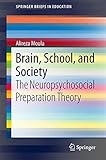Brain, School, and Society [electronic resource] : The Neuropsychosocial Preparation Theory / by Alireza Moula.
Material type: TextSeries: SpringerBriefs in EducationPublisher: Cham : Springer International Publishing : Imprint: Springer, 2017Description: XV, 167 p. 13 illus. in color. online resourceContent type: text Media type: computer Carrier type: online resourceISBN: 9783319551708Subject(s): Education | Education -- Philosophy | Literacy | Social justice | Human rights | Education | Learning & Instruction | Educational Philosophy | Literacy | Social Justice, Equality and Human RightsAdditional physical formats: Printed edition:: No titleDDC classification: 371.3 LOC classification: LB5-3640Online resources: e-book Full-text access
TextSeries: SpringerBriefs in EducationPublisher: Cham : Springer International Publishing : Imprint: Springer, 2017Description: XV, 167 p. 13 illus. in color. online resourceContent type: text Media type: computer Carrier type: online resourceISBN: 9783319551708Subject(s): Education | Education -- Philosophy | Literacy | Social justice | Human rights | Education | Learning & Instruction | Educational Philosophy | Literacy | Social Justice, Equality and Human RightsAdditional physical formats: Printed edition:: No titleDDC classification: 371.3 LOC classification: LB5-3640Online resources: e-book Full-text access | Item type | Current library | Collection | Call number | Copy number | Status | Notes | Date due | Barcode |
|---|---|---|---|---|---|---|---|---|
| E-Books | MEF eKitap Kütüphanesi | Springer Nature | LB5 -3640 (Browse shelf (Opens below)) | Available | NATURE | 1419758-1001 |
Preface -- Chapter 1: Introduction -- Chapter 2: Open Research and Philosophical Questions -- Chapter 3: Building a Framework for Five Sensitizing Concepts -- Chapter 4: The Methodology of the Intervention Research -- Chapter 5: Describing the Intervention in the Classroom -- Chapter 6: The Results of the Intervention -- Chapter 7: Reflective Integration of Conclusions for Theory Building -- Chapter 8: Neuropsychosocial Preparation Theory -- Chapter 9: The Power of Systematic Thinking -- Chapter 10: Discussion -- Chapter 11: Applying the New Theory in other Subprojects.
This book reports on a research program designed to construct the basics of a new type of literacy that teaches pupils social problem-solving at individual and collective levels. It is the first of a series of books about a chain of intervention research subprojects started in 2009 teaching pupils basic skills to make well-balanced decisions; to resolve conflicts in a nonviolent manner; and to develop good social relationships and responsibility, critical thinking, and other abilities which give children and young people the tools needed to pursue their options in life. According to the United Nations, there is no systematic program in schools that develops these capacities in pupils. This volume fills the gap by describing successful classroom interventions and by developing a framework for social problem-solving literacy as mandated by the United Nations Child Convention. .
5
